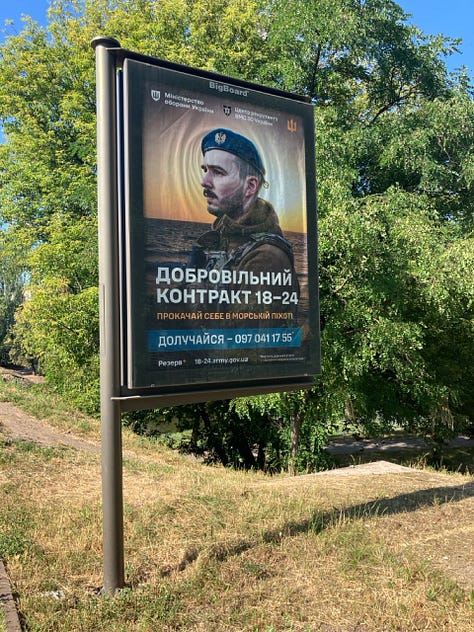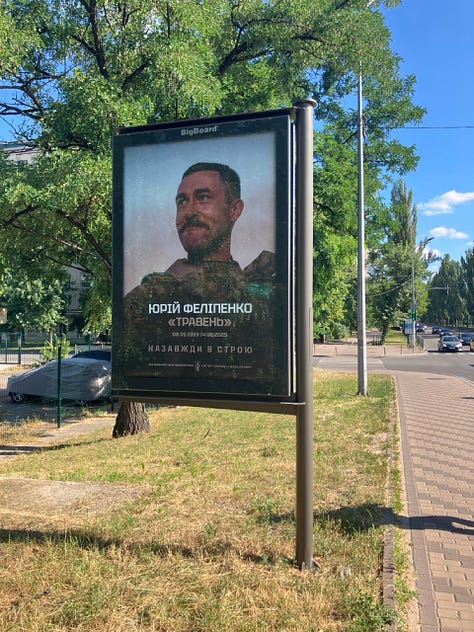This 4th of July Claire Berlinski produced a piece of conceptual art by publishing the full text of the Declaration of Independence (with no additional comment). Eloquent, courageous, the declaration speaks for itself: a performative gesture that transformed a line of thought, stretching back to Aristotle, into action so potent that the nation it birthed lived a long, prosperous life of nearly 250 years.
I, however, was wrecked after the fireworks show that russia put on in Kyiv on the eve of America’s birthday. It began mere hours after Tru + Pu had their latest phone chat.
Sometime after 1 AM my feisty neighbors decided to get together on a lower floor of our building to soothe their anxiety around the kitchen table. My fear of the morning after leaving bed at that hour to go drinking was greater than my fear of getting struck by a russian drone in my sleep, so I stayed home. Still felt like shit the next morning.
russia had sent a record-breaking 539 drones + 11 missiles at Kyiv. They attacked again the night of July 4, set a new record on July 8 (728 drones + 13 missiles focused on Ukraine’s northwest), and then pummeled Kyiv again on July 9.
Wednesday night, as I lay in bed, a question kept running through my mind: Will I be in the army by the time a russian drone or its fragments hit my building?
It’s not the question that was keeping me up, but the barrage of various sounds outside my window. The drones’ mosquito whine is familiar, but now we have so many different ways to try to bring them down that I can no longer decipher all the noises. What does a missile flying through the air sound like? Was that a Patriot anti-aircraft battery going off? Did it hit its target? I don’t know what kind of sound drone fragments that fall from the sky after being struck down by air defense make when they land on a building or car or yard or human. This new cacophony doesn’t help me orient in the situation I’m in or guide my actions. I just listen.
Still, I am well aware that the soothing rat-a-tat-tats and the occasional rifle shot — noises that are unmistakably “ours” — are the work of Ukrainian defenders performing their duties. People — no different from me — racing around the city all night as the waves of drones keep coming and coming. Only I am lying in bed waiting for sleep, avoiding making any decisions.
***
Kyiv this summer is eerily empty. Someone recently likened the atmosphere and security situation to the first months of russia’s full-scale invasion. I don’t agree. Years have passed, where the decisions we’ve made — both as individuals and as countries — have revealed what we’re capable of achieving and how we’re capable of failing.
How can people keep living as civilians in a city where russian missiles and drones fall from the sky more frequently than rain? A free person with any sense — and means — will either leave (in search of conditions for living) or fight (to make your home livable). You cannot live in indecision indefinitely.



Last week I had a dance lesson after a month-long hiatus. Afterward I learned that one of my favorite partners just joined the military. He’s a computer graphics artist, barely 30, and a finely trained dancer. I sent him a message of congratulations. I also have a pit in my stomach.
The US abruptly halted the supply of defensive weapons to Ukraine just before Independence Day because its “stockpiles are getting low.” Then Trump promised 10 Patriot missiles (compare this with the numbers of missiles russia sends during each airstrike). Now he’s making noise about potentially selling more weapons to NATO to give to Ukraine.
Meanwhile my Ukrainian friends (not only men) keep signing up for the armed forces.
Ukraine’s people have decided - repeatedly - with sacrifice, violence, and courage that they do not want to be russia’s slaves or part of the ‘russian world’ or to have their people, culture, language, and history obliterated and their country laid to waste.
It seems most anybody in the free world would agree (in theory) that this is common sense, that they too would not want to be slaves or part of the ‘russian world’ or to have their people, culture, language, and history obliterated and their country laid to waste.
But in practice, it looks like the general American consensus—including among well-meaning Ukraine supporters, though who would say it outright—is that Ukraine should give up, as if that would lead to less loss. Less loss in some imaginary future that occupies so much space in the news, in discussions with political analysts, at conferences, in conversations with friends from abroad, in the minds and schedules of countless Western intellectuals and policymakers and ordinary people. It seems like the images of the future you conjure up concern you far more than the threats we face at present and the decisions they demand that we make.
***
At the moment when a Shahed is whining outside my window there is nothing particularly effective for me to do besides decide to change my position or stay where I am. I listen to the sound getting louder or quieter, taking that as a measure of relative distance. But if it ever gets so loud and then boom, by then it will be too late.
Sometimes there’s a flurry of adrenaline when the air raid alarm goes off. A primal rush when something explodes nearby. The thrill of not knowing what will come, how much, and when it will end. Morning urgency to check the news to learn about the damage.
I don’t want to tell you any more stories about how fucking exciting it is to live in a war zone.
Instead, let’s take a moment together to analyze what happens when you are the star of your own reality show:
You get the news of a new, horrific russian attack on Kyiv. 550 drones and missiles. Yikes. What do you feel? A cocktail of emotions as you imagine Ukrainians, some are friends, colleagues, family, in danger again. Do you think of them having to go to the bomb shelter, their fear of being struck, their sleep disrupted? Your mind sharpens and you remember the specific people you know in the city, people you care about. Your heart swells, you are stirred to action. Send out a handful of messages to check in, to let them know you are thinking of them. Wait for a response. Are you nervous? Does your mind turn over a list of practical actions — post on social media, donate, write to your senators? Do your emotions breed fantasies (like Trump and Putin sitting in one room and a Ukrainian drone buzzes closer and closer . . . )? Your friend replies. Then another. A red heart icon, a few words, hugs all round. A sense of relief. A micro-closure. And back to business as usual until . . .
It’s a bit of a roller coaster ride, isn’t it? Just like at the amusement park, you get big thrills and then emerge unscathed, legs a bit wobbly. And then you get in line to ride it again.
You know, the Ukrainian word for rollercoaster is “американські гірки” — little American mountains.
***
Wars end when one side decides that they cannot achieve their goals with the means at their disposal.
The notion of some third party brokering a deal with the warring parties “to stop the madness” is utter bullshit. The feelings of suspense, danger, rage, sorrow, “empathy” set in motion by terrorist states like the russian federation and terrorist regimes like Trump’s create an emotional roller coaster that distracts from the terrorists’ actual criminal deeds.
And each yank and pull of your attention and emotions this way and that, dear reader, is a calculated attack on your mind and body. The time and energy spent are yours.
I fear that my generation’s contribution to Western culture is the above-mentioned emotional rollercoaster. What this has to do with growing up watching sitcoms and Hollywood movies while living in relative safety and prosperity is a question too great to address here. But being the star of your own reality show may be the legacy of the generation before. They laid the tracks for a “pursuit of happiness” that’s all about you and your personal feelings.
What if I decide to stop riding the roller coaster? I’m tired of being lured and yanked and compelled. The scaffolding holding up those “little American mountains” is getting too wobbly. But the ground on which the roller coaster stands is still there, and it needs attention, and it may still be possible to cultivate.
We have to protect the ground — from developers, poison chemicals, cluster munitions, mineral extraction, mines. If I keep postponing accepting my duty to protect my land and people until the time that I’m “ready,” then what will be left for me to defend?
PS You must know somebody who is serving in the Ukrainian armed forces — or fighting, or doing something dirty and difficult — right now to protect you and your way of life. Send them a note, tell them you’re thinking of them, ask them how they’re doing. You won’t regret it.



You can never give up. Yes, I try but cannot imagine the horror of living in Ukraine at this time, or living in any active war zone. Thank you for providing a more intimate view of this horror. Thank you for your courage!
How can I turn off notifications? I have suddenly started getting pinging replies to this on my iPad that I do not want. Any ideas?